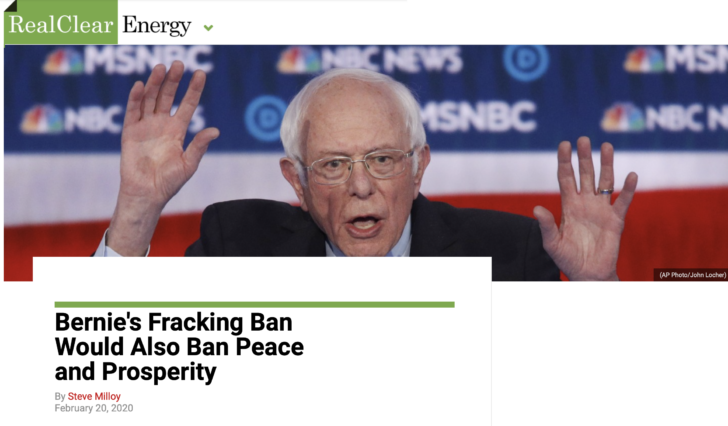My column at RealClearEnergy.com.

Bernie Sanders just introduced a bill to ban fracking on federal lands. Consider what would and would not happen if anti-frackers like Sanders had their way.
Fracking has been an energy game changer, if not a miracle. Before large-scale fracking began in the late 2000s, the United States was anything but energy independent. The vast majority of our natural gas was imported. The price of gasoline was subject to the whims of the OPEC cartel and the price swings of oil. Fracking has totally changed this.
In August 2005, a shortage of natural gas pushed the Henry Hub price to $19.19 per million cubic feet. Andrew Liveris, then CEO Dow Chemical told the New York Times in 2005 that, “American consumers worry about oil and the price of gasoline.They should worry that there may not be enough natural gas to heat and cool their homes.”
But within just a few years the development and fracking technology exposed a virtual glut of natural gas, pushing the price down to about $2.00 per million cubic feet today. We no longer import natural gas except where environmentalists force imports by blocking pipelines.
In July 2008, an oil crunch sent the price of oil to $147 per barrel. Thanks to fracking the price of oil is now in the mid-$50 range.
So the first consequence of ending fracking would be economic. Oil and gas would likely cost a lot more, especially since countries like China and India have become much larger consumers of oil over the past 15 years.
Next, all this oil and gas belongs to the United States. We have so much oil and gas that we are a net exporter for the first time since the early 1950s. This means that we are much less at the mercy of the whims and manipulations of OPEC members.
Without fracking, for example, the recent turmoil with Iran might have caused another serious spike in the price of oil. The economic consequence of a price spike would then affect how the crisis was managed. But thanks to fracking, we sailed through the recent Iran crisis with a hardly a blip in the price of oil.
But there’s more. There’s jobs and GDP.
In Pennsylvania alone, there are 350,000 fracking-related jobs. Ohio and Michigan have another 400,000 fracking workers. There are as many 1.5 million workers in the industry and there are another 4 million jobs industries that depend on cheap natural gas. Fracking is worth at least $1 trillion to the US economy.
For those who are concerned about climate change and emissions, fracking is a winner, too. Burning natural gas emits about half the carbon dioxide of burning coal. Fracking is what has made it possible for US utilities to cut their reliance on coal by more than half, from slightly more than 50% of power generation to less than 25%. This has allowed the US to reduce its emissions the most of any industrialized country — while simultaneously accelerating economic growth.
Bernie Sanders’ fracking ban would also trigger global energy and economic crises. The contagion would start in the US because, at this point, there is no fast, easy or cheap way to replace cheap natural gas.
Wind and solar are nowhere near ready to supplant natural gas for the production of electricity. It would take years to rebuild the coal industry and many more years to add nuclear power. What would our economy do for affordable energy in the meantime?
Electricity and gasoline prices would soar, undoubtedly causing mass unemployment, recession and then depression. A failure of the US economy would spread world-wide threatening a global economy that 7.6 billion people depend on.
As always happens, a poor economy would cause domestic social unrest and spur international bad actors (think Iran, Russia and China) to take advantage of a weakened, if not chaotic US.
Yet CO2 emissions would continue to grow, because the rest of the world, particularly Asia, has no plans to reduce fossil fuel use.
Bernie’s fracking ban may sound great – if you understand nothing about energy, the economy and the environment – but it would rapidly become a global disaster. And a pointless one at that.
Steve Milloy publishes JunkScience.com, served on the Trump EPA transition team and is the author of “Scare Pollution: Why and How to Fix the EPA” (Bench Press 2016).